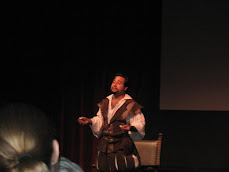By Chris Joseph Thursday, Mar 24 2011
Written and presented in a kind of '70s sitcom vibe (think Chico and the Man with F-bombs), Superior Donuts is Tracy Letts's followup to his Pulitzer Prize-winning August: Osage County(currently playing at Actors' Playhouse at the Miracle Theatre). If August is a cauldron of familial complexities and dizzying dysfunction, Superior Donuts gives us the opposite. It's lighthearted, simple, and oftentimes sentimental. That doesn't mean it isn't filled with nuance or substance.
Avi Hoffman plays Arthur Przybyszewski, a white, aging, pony-tailed proprietor of a doughnut shop on Chicago's North Side. Arthur was once a '60s radical who marched against the Vietnam War, but now he's letting life ease by without putting up much of a fight. His shop is dilapidated and empty, save for the homeless lady who comes around for free doughnuts and coffee every other day. He is worn down, and his life has hit some rough waters. His ex-wife recently passed, and he hasn't seen his daughter in decades.
When Arthur walks into his shop to open it for the day, he finds shattered glass on the floor and the word pussy scrawled in huge letters on the wall. The neighborhood cops are there, as is Max, the Russian owner of a DVD store next door. Max called the police, and he's railing against the "black bastards" who did this to Arthur's store. Without a trace of anger or bewilderment, Arthur shrugs and begins to clean up. Here we see him in all his defeatist glory. Life just beats you down at every turn, so why bother trying?
Not until Franco Wicks (played by a scene-stealing Marckenson Charles) strolls into Arthur's shop looking for a job do we see some vitality enter the world-weary hippie. Franco is everything Arthur isn't. The young man is energetic, charismatic, ambitious, and filled with new ideas and dreams. He's also black. Of course, this is where a play such as this can easily fall into the clichéd traps often seen in old-white-man/young-African-American-man dynamics. In the hands of a lesser playwright, the relationship between the two men would lapse into a sort of tired Do the Right Thingaesthetic where lessons on race relations are shoehorned into the plot. But Letts doesn't do that. The differences between Arthur and Franco go beyond skin color. Sure, there are the requisite scenes where Franco uses his race to make certain points. But it's mostly in jest and mostly because Franco is a smart kid who likes to see how far he can get under Arthur's skin.
Franco's sharp wit and likability get him hired, and it's not long before he's badgering Arthur to spruce up the joint. Franco envisions a modern shop with more healthful choices, wireless capability, and poetry reading nights. "Poets don't pay the bills," Franco tells a begrudging Arthur. "But poets drink coffee like a motherfucker." Throughout the play, Franco tries to steer Arthur in the right direction to lure more customers, while sharing with him his own ambitions and goals. He also nudges the old man into asking police officer Randy Osteen (played by Patti Gardner, who put in a valiant performance despite a case of laryngitis) on a date. Officer Osteen is obviously into Arthur, constantly dropping hints and giving him her personal cell phone number.
But trouble is simmering beneath Franco's otherwise genuine bravado. When a pair of two-bit loan sharks enters the doughnut shop one day, we learn that Franco is in debt way over his head. His minimum-wage job working for Arthur just isn't cutting it.
It's the colorful characters strewn throughout the play that give Superior Donuts its substantive ebb and flow. DVD storeowner and Russian immigrant Max (hilariously played by Chaz Mena) remains steadfast in trying to buy Arthur's shop to expand his business. Gordon McConnell and Paul Homza's loan sharks lend some weight as the play's heavies; McConnell in particular gives his character, Luther Flynn, depth via his passive-aggressive threats toward Franco and Arthur. Sally Bondi turns in a touching and authentic portrayal as Lady, the homeless woman who frequents the doughnut shop, while John Archie is solid and comical as the Star Trek-loving Officer Bailey.
Superior Donuts's dialogue is filled with quick banter and comedic rants, mainly involving the incorrigible Franco, though Letts probably could have done without the brief soliloquies Arthur gives throughout the story. They fill in Arthur's backstory and help explain what makes him tick, but they seem forced and unnecessary in the otherwise fast-paced story.
Director Joseph Adler has done a masterful job with this production's ensemble. Led by the talented Mr. Hoffman, Superior's actors all have stage presence and great comedic timing — essential in a play where the dialogue is everything.
As with every GableStage production, Superior Donuts has an outstanding set. The entire two-act play takes place inside Arthur's shop, and thanks to set designer Lyle Baskin, as well as GableStage's intimate setting, the audience not only feels as if it's sitting inside a genuine doughnut and coffee shop, but also that the weather outside is wintry. The stools, the smell of brewing coffee, and the fresh doughnuts in the display case put the audience inside Arthur's shop.
To top it all off, a fight scene choreographed by Homza is as graphic and violent as you'll see performed during a live production.
At a little less than two hours, Superior Donuts makes for an entertaining evening of theater.






















No comments:
Post a Comment